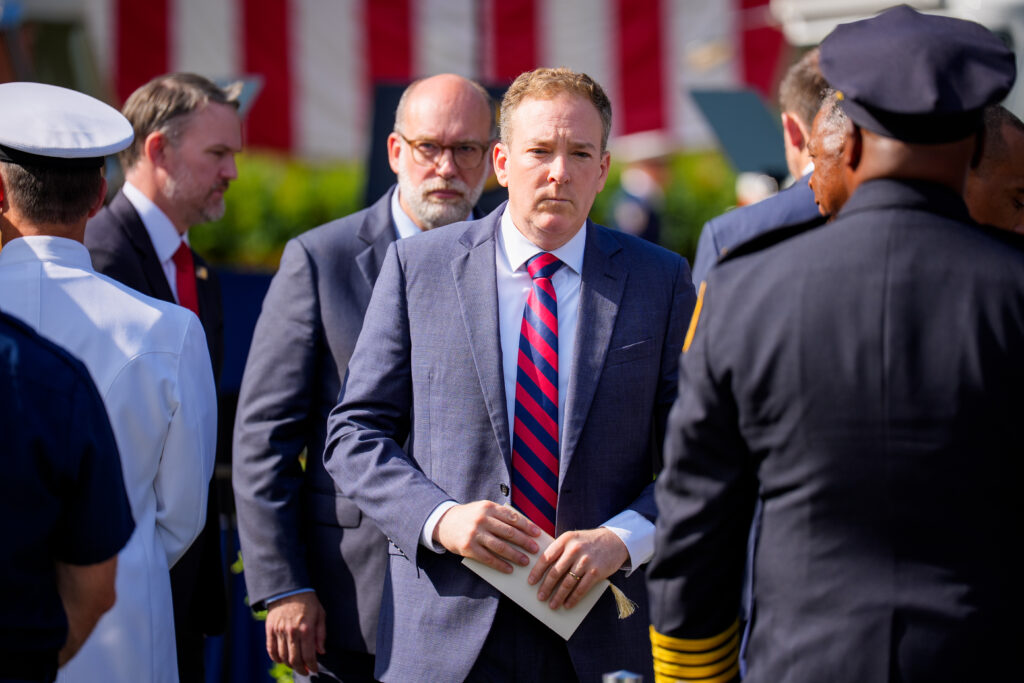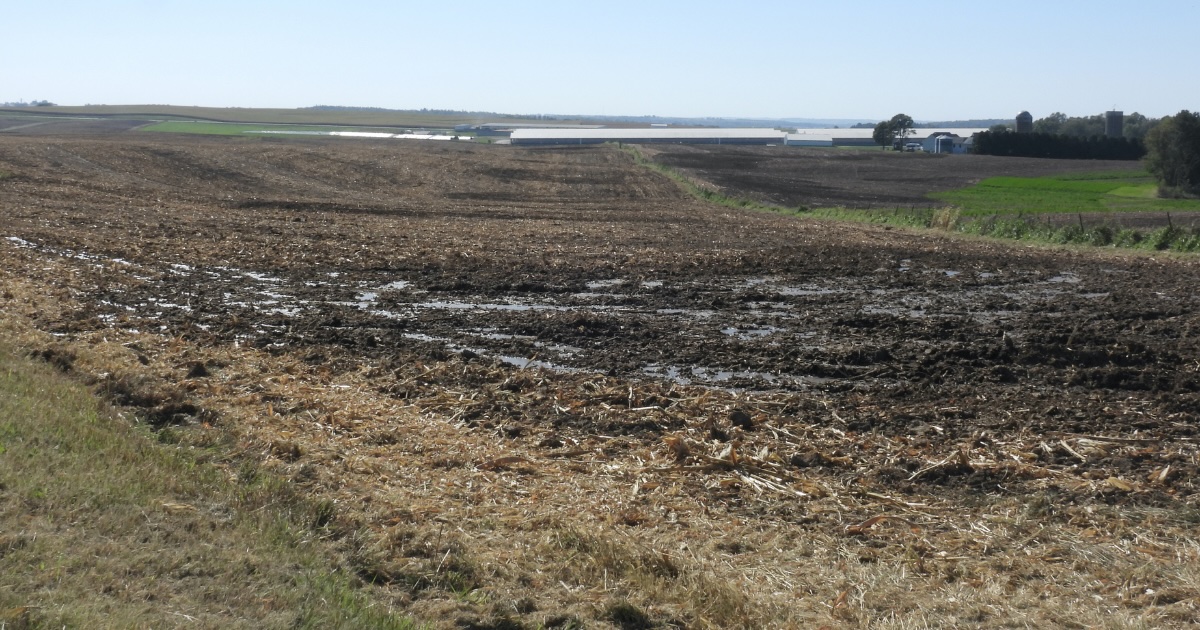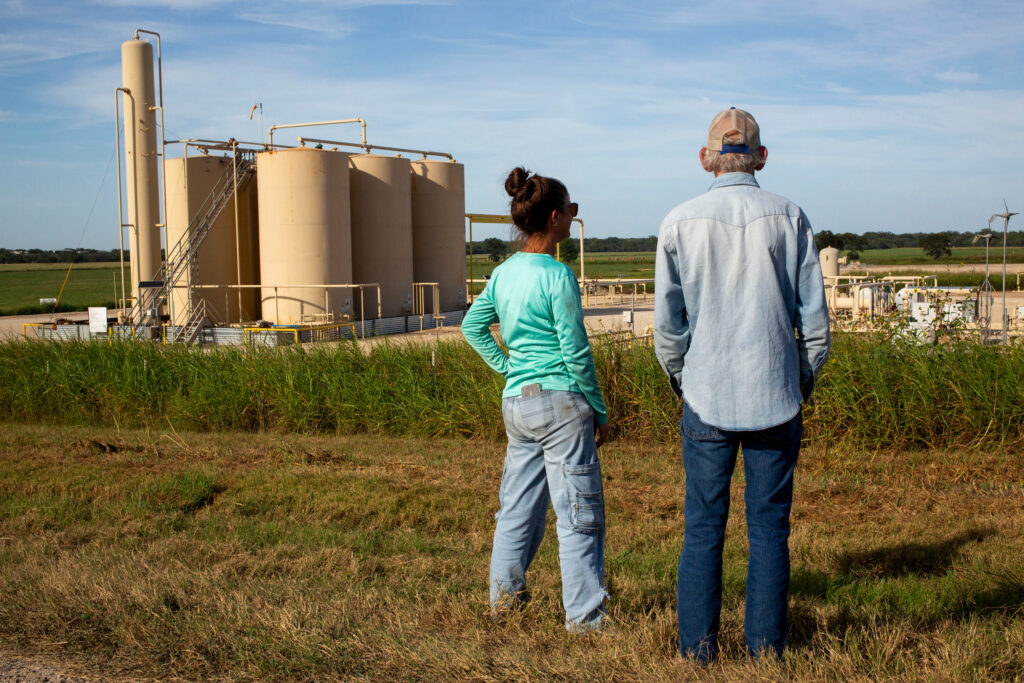SHILOH COMMUNITY, Ala.—Their land is bound forever.
The deeds of three homeowners—Pastor Timothy Williams, Aretha Wright and Page Jones—all living in the historically Black Shiloh community of south Alabama, tell the tale.
Restrictive covenants attached to their deeds limit the ability of current and future residents to file actions against the state. The legal instruments are the result of an effort by the State of Alabama to stem citizen claims related to flooding, according to newly obtained records analyzed by Inside Climate News.
“This release is agreed to be a covenant running with the land, binding on any future successor in interest or title,” the restrictive covenants say.
We’re hiring!
Please take a look at the new openings in our newsroom.
See jobs
The covenants, released by the Alabama Department of Transportation (ALDOT) in response to a records request by the Southern Environmental Law Center, show that agency officials have been aware of residents’ flooding concerns for years.
Restrictive covenants are legal instruments attached to property deeds that limit the use of the property in some way. Such legal instruments can be used for relatively benign purposes by governments or other entities to enforce rules around upkeep or other issues. Over time, the use of covenants in Alabama has been discriminatory in purpose, historically preventing, for example, Black citizens from owning property in certain areas.
Residents in Shiloh fear that the restrictive covenants on their property are an extension of that racist past – an effort by the state to move on from flooding that began years ago.
In that time, residents say, conditions haven’t changed. Instead, when the rain comes, so does the anxiety. The floodwaters often follow.

Before and After
Residents in the Shiloh community talk about “the before” and “the after.”
There’s the time “before,” like when Ronald McKinnon was growing up in the neighborhood, years before he’d become an NFL linebacker for the Cardinals and the Saints. Shiloh never flooded then, McKinnon said.
Then there’s the “after,” following the expansion and elevation of U.S. 84 that began in 2017. The project left the highway nearly level with the roof of Pastor Timothy Williams’ home, just a stone’s throw away.
He was one of the first residents to express concerns about flooding caused by the state’s highway expansion, according to state records.
“Spoke with Mr. Tim Williams about his property,” a worker wrote in an ALDOT remark diary. “He is concerned about the drainage of water onto his property.”
The worker wrote that he told Williams that the state and its contractors would use “best management practices” (BMPs) to prevent any runoff from the elevated highway.
About a week later, ALDOT’s records show that its contractor had flooded Williams’ property.
An ALDOT worker received an early morning call, according to his notes: “Timothy Williams’ driveway was almost underwater.”
ALDOT workers had advised its contractor, S.A. Graham, that rainwater pooling in the median of U.S. 84 posed a “safety hazard to the traveling public” and that the contractor should use a pump to mitigate the pooling. Instead, state records show, the contractor dug two ditches to relieve the water from the median toward the highway’s shoulder. Unfortunately, records show, the water didn’t stop there.
“This caused all the water to release all at one time which caused the BMPs to be overstopped, and turbid water was released into several adjacent landowner yards,” an ALDOT employee wrote.
ALDOT employee notes also confirm that highway construction caused flooding following a rain event later in 2019.
“Met with Ms. Aretha Wright this morning about water damage that occurred to her house last night due to the heavy rainfall,” a worker wrote.
Rainwater, colored red by the Alabama clay at the construction site, had first flooded Wright’s garage and laundry room, according to the results of an engineering investigation. Water had then entered her kitchen and bedroom, Wright told the engineering firm.
The flooding displaced Wright for about nine months, she said.


The firm said that Wright’s home, which is located less than the length of a football field from the elevated highway, sits between 12 and 15 feet below the elevated pavement of U.S. 84.
“In our opinion, the water damage occurring in the garage, laundry room, and in the home was a result of increased stormwater runoff as a result of the roadway construction being performed,” the engineers concluded.
The firm wrote that it believed that additional stormwater management measures would help to divert stormwater. Residents, though, said that’s not what happened.
Instead, in the years since, residents along U.S. 84 in the Shiloh Community have dealt with significant flooding after every heavy rain event.
Bound Forever
After the flooding began in the Shiloh community, residents began to seek ways to recover the costs they incurred at the hands of the state and its contractor. Some of the residents turned to a Birmingham-based attorney, Calle Mendenhall, for help. Residents said that Mendenhall recommended various ways of trying to recoup their costs, including filing claims with the state board of adjustments, which handles allegations of damages caused by the state or its agencies.
In the end, Mendenhall recommended that the homeowners in Shiloh settle with both the contractor and state, residents said, leading to an agreement where property owners received relatively small amounts of cash to cover documented costs like repairing water damage caused by flooding.
Both Wright and Williams said that they did not know that the agreement would result in a restrictive covenant being placed on their property.
The covenant, which applies to current and future property owners, restricts the ability of residents to file future claims against the state related to highway flooding from U.S. 84 and requires that homeowners disclose the floods when selling to a new owner.


The legal documents say that Wright, Williams and one other Shiloh resident own their property “subject to the continuing condition and restriction that they fully, completely, irrevocably and absolutely release, remise, acquit and forever discharge” all claims against the state related to stormwater flooding.
In an email, Kaasha Griffin, an assistant counsel for ALDOT, wrote to Director John Cooper recommending that he and Gov. Kay Ivey endorse the use of restrictive covenants to limit future claims against the state.
“The covenant and agreement are in relation to a Board of Adjustment claim filed by Ms. Wright concerning flooding on her property. The attached covenant and agreement have been entered into to prevent future actions including Board of Adjustment claims concerning the property described herein,” Griffin wrote to the agency head. “Approval is recommended.
Both Cooper and Ivey would end up signing the covenants. So, too, would Wright, Williams and at least one other Shiloh resident. The homeowners said they didn’t understand their efforts to recoup their losses would result in an inability to advocate for themselves down the road through legal action if needed.
“We didn’t know that,” Williams said. “They did it without our permission. They slipped it in. We had no idea we were signing away our rights.”
Wright, too, said she felt like the substance and consequences of what she was signing weren’t explained to her in a thorough, comprehensive way by Mendenhall.
Mendenhall declined a request for an interview but said in a written statement that her firm is “dedicated to pursuing justice” for its clients.
“We maintain the utmost level of confidentiality regarding our clients’ cases and personal information,” the statement said. “It is our policy not to discuss matters related to settlements or other sensitive matters in order to honor our unwavering commitment to providing the strongest legal representation possible.”
Williams said that his privacy should be no justification for Mendenhall to avoid answering questions about her involvement in Shiloh.
“She shouldn’t stay quiet because of me,” he said.
A History of Restrictive Covenants
Restrictive covenants on property deeds have long been used in Alabama and beyond as a tool of white supremacy, according to experts, allowing those in power to prevent people of color from owning property in particular areas. Early on, Alabama’s state government endorsed the use of such restrictions, with its supreme court upholding the practice in 1928.
“All lots sold for residential purposes only… No lots can be resold or transferred to negroes,” the restrictive covenants for land in Montgomery’s Cloverdale neighborhood said at the time, according to court documents in the case.
That covenant, the court ruled in Scheuer v. Britt, was permissible and enforcible because without it, an owner might “convert the district into a negro settlement in violation of the restriction… rendering the property…less valuable and less desirable for residential purposes.”
It wasn’t until decades later, in 1948, that the U.S. Supreme Court ruled that racial covenants violated the U.S. Constitution. Despite the ruling, federal and state officials would continue discriminatory practices in housing for years to follow.


Wright said that she hadn’t been aware of the racist history of restrictive covenants until long after she’d signed the covenant on her home, unaware of its effect. She said she believes that governments should not be able to use deed restrictions to prevent legitimate claims from residents who’ve been harmed by the state. Particularly given what’s happened in historically Black Shiloh, she worries Alabama’s use of deed covenants may be racially discriminatory.
“Our lawyer assured us that signing this was the right thing to do,” Wright said. “We were lied to.”
Inside Climate News has requested copies of all restrictive covenants signed by Alabama officials in the last five years. The Alabama Department of Transportation did not respond to requests for comment on this story.
Investigation, Retaliation
The situation in Shiloh recently garnered nationwide attention when Secretary of Transportation Pete Buttigieg visited in April, part of a tour of communities confronting histories of infrastructure decision-making that subjected some residents, who often live in communities of color, to shoulder disproportionate harms from pollution, flooding and abandonment. Buttigieg had come at the invitation of residents and of Robert Bullard, an environmental scientist, activist and Alabama native who serves on Biden’s White House Environmental Justice Advisory Committee.
“There is no way I’m going to forget what I just heard,” Buttigieg said after touring Shiloh and hearing directly from residents, including Williams and Wright.
The issues facing Shiloh are being worked on “at the highest levels of our department,” the secretary told community members.
“I don’t claim to have a magic wand on me, but I have a lot of tools,” he said. That can involve both tools to ensure state officials “treat people well” and tools that allow federal officials to channel funds directly to communities, he said.


The secretary’s visit came amid a federal investigation into “whether the Alabama Department of Transportation and Coffee County violated Title VI [of the Civil Rights Act] by not resolving the flooding issues impacting the community residing between US Highway 84 and County Road 502,” according to a letter from the agency confirming the investigation.
Just a day before Buttigieg’s visit, state officials told a local television station that it would offer to buy “protesting” residents’ homes or, alternatively, “implement a project to retain additional water on state right of way.”
Residents said they have no intentions of leaving and no trust that ALDOT, whom they view as having caused the problem, has the ability or willingness to implement a meaningful fix.
“That’s crazy,” Williams said of the offer, which he learned of through members of the press. “Why not just come here, fix the road and make us whole?”
Searching for Progress
A month after Buttigieg’s visit to Shiloh, no real progress has been made on the ground, residents have said.
Instead, Williams said he has faced continued retaliation from white people in the community over his vocal advocacy.
On Tuesday, lawyers for Williams filed a lawsuit against the Ben E. Keith Company, located near Shiloh in Coffee County, over claims that its leadership canceled Williams’ cleaning contract over his advocacy.
According to the suit, after working as a cleaning contractor for the company for years, Williams received a deposit of nearly $200,000 from the company in error. The deposit, Williams felt, was meant as hush money to quiet his complaints about flooding in Shiloh. Williams contacted the company repeatedly about the deposit, records show, and was eventually told he could return the money.
This story is funded by readers like you.
Our nonprofit newsroom provides award-winning climate coverage free of charge and advertising. We rely on donations from readers like you to keep going. Please donate now to support our work.
Donate Now
Soon after that repayment, the suit alleges, Williams’ contract with Ben E. Keith was canceled, a move the pastor said he saw as an act of retaliation.
“Once the money was received back from Mr. Williams, Defendant BEK terminated the contract Destiny [William’s cleaning company] had with BEK in retaliation for him not accepting the money and refusing to remain silent.”
Efforts to reach Ben E. Keith’s management were unsuccessful.
In the end, Williams said that he’ll continue to organize residents until the community’s water woes are addressed, whether he faces retaliation or not.
Wright, for her part, said she only hopes heavy rain holds off until a solution comes. When the sky gets dark, she says, so does her mood.
“It’s a lot to deal with,” Wright said. “And we deserve better.”

















